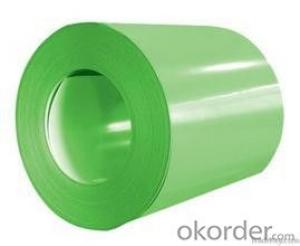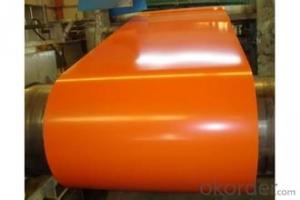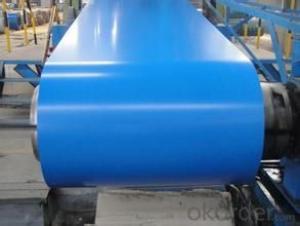Prepainted Galvanized Rolled Steel Coil-DX51D in CNBM
- Loading Port:
- Tianjin
- Payment Terms:
- TT OR LC
- Min Order Qty:
- 30 m.t.
- Supply Capability:
- 500000 m.t./month
OKorder Service Pledge
OKorder Financial Service
You Might Also Like
description
prepainted galvanized steel usually refers to have substrateprocessed with surface processed and coated then(roller coated )or bonded organic thin film and baked, and it is able to be processed tofinal prodevtion .
prepaintedgalvanized steel qualified with excellent decorative ,formability ,corrosionresistance ,coating adhesion ,can keep for a long time as well as maintainfresh color .for color coated steel sheet can obtain good economicbenefit by steel belt wood ,efficient in construction and save energy ,preventpollution etc.which is an ideal material;for manufacturing board.
main features of the galvanized rolled steel
1. low moq: we will do our best to make you satisfied.
2.good service : we treat clients as friend.
3.good quality :we have strict quality control system .good reputation in the market.
4.fast & cheap delivery: we have big discount from forwarder (long contract).
5.supply ability: 50000 ton monthly
specification
yield strength | (mpa) 280-320 |
tensile strength | (mpa) 340-390 |
elongation | 20%-30% |
reverse impact | 9j |
t-bending | ≥2t |
pencil hardness | ≥2h |
duration of salt spray test | 500 h |
bending at 180 degree | no crack, purling and fraction |
image
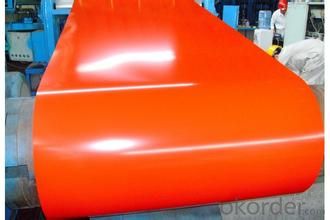
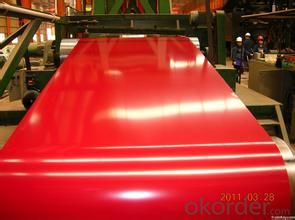
applications ofprepainted galvanized steel
it can be widely used in transportation, light industry, civil usage and farming. it is also the perfect building material in construction for making steel roofing,insulation panel, corrugate sheet, facade wall,shutters,t-bar and home appliance.
- Q:How did the growth of the steel industry influence the development of other industries?
- At least three ways: 1. Steel as a material that other industries could use to do things that couldn't be done before (for example, construction (skyscrapers, long bridges, etc.)) or could now be done at much lower cost and hence increased the size of the industry (automobiles, bearings, etc.)
- Q:Can steel coils be welded?
- Yes, steel coils can be welded. Welding is a common method used to join steel coils together or to other steel components, allowing for the formation of strong and durable connections in various applications.
- Q:Why is steel a stiff material?I'm doing a project on the use of steel in the construction of skyscrapers - and obviously, for the inner steel skeleton of a skyscraper the steel support beams and girders will have to be stiff so that they don't fall apart or the building doesn't shake due to wind or other natural forces.But in my research I've found that steel (mild steel to be more exact) is ductile and malleable, meaning it can be shaped fairly easily. However, how can steel ALSO be stiff - the definition of stiffness is the tendency to withstand bending and stretching - so my question is. How can this material be BOTH ductile/malleable, AND stiff? and why? :)Thank you in advance if anyone takes the time to answer this, would be appreciated - I'll give you 10 points straight away if the answers conclusive
- Steel is NOT stiff. In fact it is worldly accepted metals (steel is a metal) are not rigid in mechanical terms, and rigid means stiff. Steel easy to shape, but is strong and therefore hard to break. Thermosetting polymers (hard plastic) which is stiff, is in fact easy to break (weak) and also hard to reshape without changing its state (solid to liquid). Whoever told you steel is stiff is wrong and possible meant steel is strong, or you misheard/misunderstood.
- Q:I'm pretty sure that this topic has been beaten to death by now. But, I still can't get a definite answer. With stainless steel, you get better corrosion resistance, and you will hold and edge longer. With carbon steel, you will hold a sharper edge, and you could forge a knife blade longer than 2 ft without breakage. I'm personally a fan of stainless steel ( the 440 grade stuff ), just because it seems to hold up to use and abuse better in the long run. HOWEVER, I have NEVER had a factory made knife break on me. I don't think that they would try to sell you a knife that didn't do what it was meant to do, at least to a reasonable degree. (I work for a living, and can't afford a custom $600 knife.) What do you think? Is this a pointless topic? Will there ever be a winner?
- You didn't say WHICH type of stainless steel, which will make all the difference. There are $2 stainless steel knives and $200 stainless steel knives. The best stainless knife steels will rival the best high carbon steels when it comes to edge-holding properties. These days MOST of the best knives on the market are made from premium stainless steels because of the lower maintenance, but a high carbon steel knife has classic appeal and great edge-holding properties.
- Q:What are the different steel coil surface treatments?
- Some of the different steel coil surface treatments include galvanizing, painting, powder coating, and oiled finishes.
- Q:What are the common thicknesses available for steel coils?
- The specific requirements and applications determine the available common thicknesses for steel coils. However, various industries commonly produce and use certain standard thicknesses. Typically, steel coils can range in thickness from 0.005 inches to 0.5 inches or more, depending on the type of steel and its intended use. For instance, in automotive manufacturing, where steel coils are utilized for body panels and structural components, the thicknesses commonly range from 0.5 mm (0.020 inches) to 3 mm (0.118 inches). In the construction industry, steel coils are employed for roofing, siding, and structural framing. The common thicknesses can vary from 0.014 inches to 0.062 inches, depending on the specific application and structural requirements. Similarly, appliances manufacturing, such as refrigerators, washing machines, or HVAC systems, frequently employ steel coils with thicknesses ranging from 0.018 inches to 0.035 inches. It is important to note that these are only a few examples of common thicknesses, and variations can occur based on the specific requirements of different industries and applications. Custom thicknesses can also be produced upon request to meet unique needs in various sectors.
- Q:I am working on a hydrogen generator, but the stainless steel I am using corrodes and turns the water brown. Can anyone tell me if there is stainless steel that does not corrode, and if so, what is it called and where can I get some.Thank you.
- All stainless steel will corrode in certain conditions. Some varieties are worse than others. For instance grade 409 which is used for car exhausts (and other things) will rust. For the most suitable grade call a local steel supplier which carries stainless steel. Some of these companies will have a catalog of available grades and the appropriate uses. It would probably help to let them know what types of chemicals are present and what temperature the water is. You may want to call several suppliers, the quality of answer you get may vary quite a bit from company to company. The cost of exotic grades of stainless can be quite high. you may have to use a less appropriate grade if you can't justify the cost. If corrosion is a very serious concern for this be forewarned that stainless steels can be contaminated by contact with carbon steel (ordinary steel). I have seen rust form on stainless steel after a carbon steel bar was set down on the stainless steel. The carbon steel will leave trace amounts under prolonged contact. I have even seen signs of contamination of stainless steel direct from the supplier.
- Q:How can I arbitrate quality of steel before purchasing it??
- The quality of the alloy can be very well be judged by its appearance and lustrous surface. The more luster on the surface the more refine will the steel be. To judge its tenacity and endurance, the alloy can be subjected to a series of procedures involving stress and shock. The reaction to these processes can determine whether the steel be fit for the purpose required.
- Q:Why can't the coil weight be too low?
- And may make the level stacked steel coil collapse, rolling, produce production safety accidents.
- Q:How are steel coils used in the manufacturing of telecommunications equipment?
- Steel coils are used in the manufacturing of telecommunications equipment for various purposes. They are often used to create the framework and structure of the equipment, providing stability and support. Additionally, steel coils can be used for manufacturing components such as brackets, mounts, and enclosures, ensuring durability and protection for the sensitive electronic components inside the equipment.
1. Manufacturer Overview |
|
|---|---|
| Location | |
| Year Established | |
| Annual Output Value | |
| Main Markets | |
| Company Certifications | |
2. Manufacturer Certificates |
|
|---|---|
| a) Certification Name | |
| Range | |
| Reference | |
| Validity Period | |
3. Manufacturer Capability |
|
|---|---|
| a)Trade Capacity | |
| Nearest Port | |
| Export Percentage | |
| No.of Employees in Trade Department | |
| Language Spoken: | |
| b)Factory Information | |
| Factory Size: | |
| No. of Production Lines | |
| Contract Manufacturing | |
| Product Price Range | |
Send your message to us
Prepainted Galvanized Rolled Steel Coil-DX51D in CNBM
- Loading Port:
- Tianjin
- Payment Terms:
- TT OR LC
- Min Order Qty:
- 30 m.t.
- Supply Capability:
- 500000 m.t./month
OKorder Service Pledge
OKorder Financial Service
Similar products
New products
Hot products
Related keywords
